Klage/Eicha. Lament in Jewish Thought
Conference "Klage/Eicha. Lament in Jewish Thought"
University of Antwerp, February 6-8, 2013
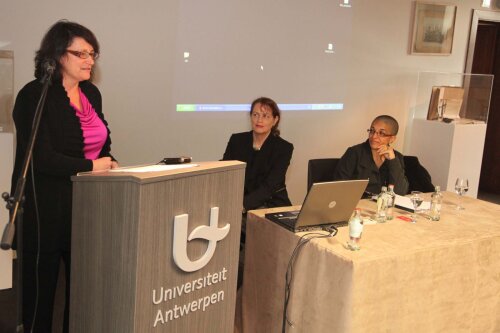
Is lament a distinctive genre? What is the relationship between lament and silence, lament and language? How does lament construe the relationship between loss and renewal, destruction and redemption? How is lament inscribed in memory and history? How does lament conceive of justice - human and divine? Has the Shoa made certain responses to destruction, violence and loss unthinkable? How does the literature of lament conceive of exile and return, and how has this narrative shaped modern responses to destruction, displacement, and postwar political developments?
In order to answer these questions, this conference gathered together an international group of scholars from diverse fields, including Jewish studies, philosophy, literature, psychoanalysis, and musicology. During the three days of the conference, the scholars engaged in a multifaceted discussion of the aesthetic, ethical and religious implications of lament, from Biblical and Rabbinic sources to the ramifications of lament in modern Jewish thought.
Program
Wednesday, February 6th, 2013
- 10.00-11.00 Welcome and Introduction by Vivian Liska, Leora Batnitzky and Paula Schwebel
- Morning Session: 11.00-12.30 - Chair: Leora Batnitzky
- 11.00-11.45 Ilana Pardes, Hebrew University of Jerusalem
Agnon's 'Edo and Enam': Between the Song of Songs and Eicha - 11.45-12.30 Vered Madar, Hebrew University of Jerusalem
Women's Oral Laments: Corpus and Text - The Body in the Text
- 11.00-11.45 Ilana Pardes, Hebrew University of Jerusalem
- 12.30-14.00 Lunch
- Afternoon Session I: 14.00-15.30 - Chair: Ilana Pardes
- 14.00-14.45 Bernd Witte, Heinrich Heine Universität, Düsseldorf
Solitude, Silence and Death. Scholem's Paradoxical Theory of Lamentation - 14.45-15.30 Eli Schonfeld, Tel Aviv University and the Shalom Hartmann Institute
Ein Menachem: On Lament and Consolation
- 14.00-14.45 Bernd Witte, Heinrich Heine Universität, Düsseldorf
- 15.30-16.00 Coffee break
- Afternoon Session II: 16.00-17.30 - Chair: Paula Schwebel
- 16.00-16.45 Galili Shahar, Tel Aviv University
Silent Syllable: The Hebrew/the Arab - the German. On Franz Rosenzweig's Translation of Jehuda Halevi's Liturgical Poems - 16.45-17.30 Adam Lipszyc, Institute of Philosophy and Sociology of the Polish Academy of Science
Words and Corpses. Celan's Tenebrae between Gadamer and Scholem
- 16.00-16.45 Galili Shahar, Tel Aviv University
- Keynote lecture: 19.00-20.00 - Introduction: Vivian Liska
Moshe Halbertal, Hebrew University of Jerusalem
Eicha: Lamentation and Mourning
Thursday, February 7th, 2013
- Morning Session I: 09.00-10.30 - Chair: Dennis Baert
- 09.00-09.45 Agata Bielik-Robson, University of Nottingham
Job's Complaint. Kinah and the Other Origin of Language - 09.45-10.30 Vivian Liska, University of Antwerp
Deferring Lament. Scholem on Job and Kafka
- 09.00-09.45 Agata Bielik-Robson, University of Nottingham
- 10.30-11.00 Coffee break
- Morning Session II: 11.00-12.30 - Chair: Vivian Liska
- 11.00-11.45 Paula Schwebel, University of Potsdam/University of Antwerp
Lament and the Transmissibility of Teachings in Scholem and Benjamin - 11.45-12.30 Rebecca Comay, University of Toronto
"The rest is silence": Lament and its Vicissitudes in Benjamin's Trauerspielbuch
- 11.00-11.45 Paula Schwebel, University of Potsdam/University of Antwerp
- 12.30-14.00 Lunch break
- Keynote lecture: 14.00-15.00
Galit Hasan-Rokem, Hebrew University of Jerusalem
The Soul's Pain Expressed by the Body: The Lamenting Mother in Ancient Hebrew Texts - 15.00-15.30 Coffee break
- Afternoon Session: 15.30-17.00 - Chair: David Dessin
- 15.30-16.15 Avery Gosfield, Ensemble Lucidarium
Étans assis aux rives aquatiques / Ain weser flist vor Bovilon - Psalm 137 and its Different Readings in the 16th Century - 16.15-17.00 Enrico Fink, Ensemble Lucidarium
'E poi si esce, senza salutar nessuno': Tisha be Av in Florence
- 15.30-16.15 Avery Gosfield, Ensemble Lucidarium
- CONCERT: 21.00 Amuz, Kammenstraat 81 - 2000 Antwerp
- Ensemble Lucidarium: By the Rivers of Babylon: Joy, Folly, Penitence and Lamentation
Friday, February 8th, 2013
- Session I: 09.00-10.30 - Chair: Paula Schwebel
- 09.00-09.45 Caroline Sauter, University of Frankfurt
Wortloses Lied das Worte nicht ermessen: Lament and Mourning in Benjamin's Theory, Poetry, and Translation - 09.45-10.30 Ilit Ferber, Tel Aviv University
Lament and Pure Language: Scholem and Benjamin
- 09.00-09.45 Caroline Sauter, University of Frankfurt
- 10.30-11.00 Coffee break
- Session II: 11.00-12.30 - Chair: Leora Batnitzky
- 11.00-11.45 Lina Barouch, Oxford University/Tel Aviv University
Gershom Scholem: Language Between Lamentation and Retaliation - 11.45-12.30 Daniel Weidner, Zentrum für Literatur und Kulturforschung, Berlin
'Movement of Language' and Transience: Lament, Mourning and the Tradition of Elegy in Early Scholem
- 11.00-11.45 Lina Barouch, Oxford University/Tel Aviv University
- Closing remarks: Leora Batnitzky
Concert Ensemble Lucidarium
Al Naharot Bavel (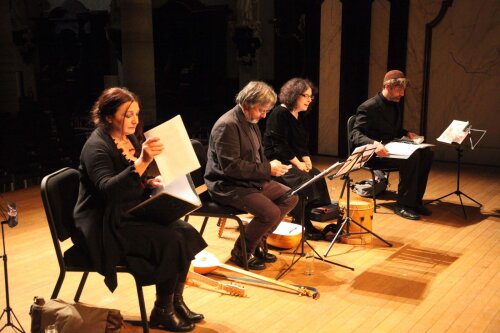
Ensemble Lucidarium
Concert at Amuz, Antwerp
Thursday, February 7th, 2013
Performers
Gloria Moretti, 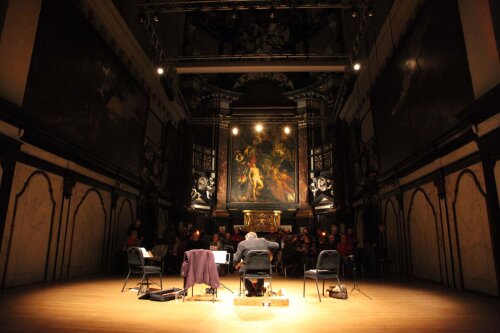
Avery Gosfield: flute, drum & one-hand flute
Francis Biggi: lute & colascione
Program
LAMENTATION Al Naharot Bavel (Psalm 137): Florentine tradition
Ufduyé Adonai: Florentine tradition for Tisha B’Av
Eli tziyon: Ashkenazy tradition for Tisha B’Av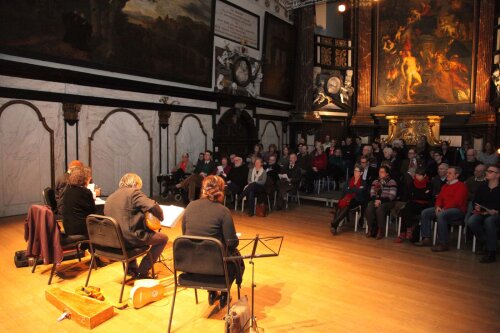
Corrente (instrumental): Giovanni Lorenzo Baldano (1576-1660) (Libro per scriver l’intavolatura per sonare sopra le sordelline: Savona, 1600)
Estans assis aux rives aquatiques: translation: Clement Marot, music: Loys Bourgeois, Les pseaumes mis en rime francoise (Geneva 1562)
Ain wėśėr fliśt vor Babilon: text: anon., GB Ox Bod. Opp. add. 4o 136, music: Wolfgang Dachstein
Lungo gli altieri fiumi: Sessanta Salmi di David /tradotti in rime volgari Italiane (Geneva: Giovan Battista Pinerolio, 1559)
Gratiosa (instrumental): Guglielmo Hebreo da Pesaro
PENITENCE AND FOLLY
Ein Khamokha / Shema Israel: Gorizia - Italian Ashkenazy tradition for Shabbat
Perdono mio dio: Lazio, penitential song for Good Friday
La Follia (instrumental)
JOY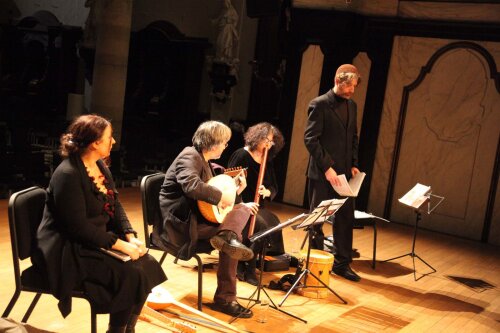
Ya saliò della mar: Sephardic tradition (Morocco)
Dize la nuestra novia: Sephardic tradition (Morocco)
Alechem edah kedoshah: Florentine tradition for Tisha B’av
Chad Gadya: Florentine tradition for Passover
Conference report
International conference "Klage/Eicha: Lament in Jewish Thought"
6-8 February 2013
The Institute of Jewish Studies at the University of Antwerp hosted scholars from Europe, Israel, and North America for the conference Klage/Eicha: Lament in Jewish Thought. This conference was the second in a series of events associated with the Research Center for the Advanced Study of Aesthetics, Hermeneutics and Ethics in Jewish Thought, a collaboration of the University of Antwerp, the Hebrew University of Jerusalem, and Princeton University. The focus on lament allowed participants to take a concrete approach to questions with wideranging implications, such as how mourning and consolation are enacted and expressed, how loss and catastrophe are taken up into a tradition, forcing it to adapt to make sense of the incomprehensible, and how the textual corpus of Lamentations has been cited and re-functioned in modernity. It was fruitful to examine these questions in light of a textual corpus that, despite variations across time (from Biblical to contemporary iterations) and place (from Eastern Europe to Yemen), retains common tropes, gestures, and symbols.
Professors Moshe Halbertal and Galit Hasan-Rokem, both of the Hebrew University of Jerusalem, gave exceptional keynote lectures, raising questions that participants returned to throughout the three days of the conference: Moshe Halbertal delivered a lucid lecture on the Biblical Book of Lamentations (Eicha) focusing on the open-ended question – how? – posed by the lamenters, whose worldview has been shattered. Halbertal’s lecture concluded with a discussion of the lack of consolation in the Biblical text, and the ‘dishonesty’ in the liturgical performance, which softens the text’s absence of comfort by repeating the second-last verse: ‘Turn thou us unto thee, O Lord, and we shall be turned; renew our days as of old.’ Galit Hasan-Rokem’s lecture focused on the interaction between body and soul in the Biblical Book of Lamentations and Lamentations Rabbah, highlighting the figurative language and performative aspects of these texts. Her analysis of the performing body in the cultural and religious contexts of these texts raised questions about the representation of the divine body, but also of the suffering and dying human body, the procreating erotic body, and the complexity of articulating its transformations and its annihilation. Hasan-Rokem’s thoughtful questions and commentary throughout the conference also reminded us that lament is an almost universal phenomenon, both diachronically, and across cultures.
Questions broached by the keynote lectures were amplified in the papers given on the first day: In contrast to Halbertal, Eli Schonfeld (Tel Aviv University and the Shalom Hartmann Institute) offered a reading of lament as a form of consolation, in which a self closed in on itself in suffering opens itself up to transcendence. Vered Madar (Hebrew University of Jerusalem) took up the themes of gender and performativity in her presentation on Yemenite women’s oral laments, based on laments that she recorded from women who were born in Yemen and immigrated to Israel during the fifties. Ilana Pardes (Hebrew University of Jerusalem) also looked at the adaptations of Biblical literature in the modern Israeli context, focusing on S.Y. Agnon’s use of the Song of Songs in ‘Edo and Enam.’ The afternoon session continued to explore the vicissitudes of lament in modern Jewish thought: Bernd Witte (Heinrich Heine University, Düsseldorf) gave the first of several lectures on Gershom Scholem’s 1917 essay ‘On Lament and Lamentations,’ focusing on the text’s nihilistic elements. Adam Lipszyc (Collegium Civitas, Warsaw) gave a close reading of Paul Celan’s “Tenebrae,” contrasting H.G. Gadamer’s Christological interpretation with a reading derived from Scholem’s theory of lament. Lipszyc ultimately argued that Scholem’s theory of lament remained too theological, holding out hope for redemption, where Celan’s poem allows none. Galili Shahar (Tel Aviv University) discussed Franz Rosenzweig’s translation and commentary on the liturgical poems of the Judeo-Arabic poet, Jehuda Halevi, arguing that Rosenzweig suppressed the ‘silent syllable’ characteristic of Judeo-Arabic poetry.
The second day saw a continuation of our discussion of lament in modern Jewish Thought: Speaking primarily about Walter Benjamin and Gershom Scholem, Agata Bielik-Robson (University of Nottingham) argued that lament offers an ‘other’ origin of language, besides the Greek tradition of Logos, in which meaning is found in the expression of suffering, rather than the communication of contents. Vivian Liska (University of Antwerp) gave a lecture on the figure of Job in Kafka, which she read in light of Scholem’s 1918 commentary on Job’s Lament. Liska’s talk introduced the significant theme of divine judgment and justice, which, she argued, is glimpsed only in the deferral of the verdict. Paula Schwebel (Duquesne University / University of Antwerp) argued for the central place of the ruin and the fragment in Benjamin and Scholem’s early work on language and history. Rebecca Comay (University of Toronto) paired a close reading of Benjamin’s 1916 essay ‘On Language as Such’ with an argument about how mourning, understood as a speech act, necessarily fails. The second day was capped by a concert given by the Ensemble Lucidarium, featuring liturgical music performed on Tisha B’Av in Renaissance Italy. Two of the musicians, Enrico Fink and Avery Gosfield, gave preperformance lectures about the history and liturgical performance of the music.
The third and final day focused on the textual exchange between Walter Benjamin and Gershom Scholem on the language of lament: Caroline Sauter (University of Frankfurt) gave a profound analysis of Benjamin’s youthful sonnets, which were written after the suicide of his friend, the poet Fritz Heinle. Ilit Ferber (Tel Aviv University) argued that Scholem’s theory of lament should be understood as a realization of ‘pure language,’ which she understood as an attempt, on the part of both Benjamin and Scholem, to remain within a Kantian framework while rectifying Kant’s blindness to language. Lina Barouch focused on the recurrence of the idea of lament in Scholem’s polemic writings between 1916-1931, arguing that Scholem transfers his theoretical ideas on lament to the empirical realm of German-Jewish and Zionist history. Finally, Daniel Weidner spoke about Scholem’s texts on lament in the context of the literary tradition of elegy, focusing on the key idea of the ‘poetic afterlife’ in Benjamin and Scholem, as well as the formal characteristics of elegy, which inform Scholem’s discussion of the poetic language of lament.
Paula Schwebel